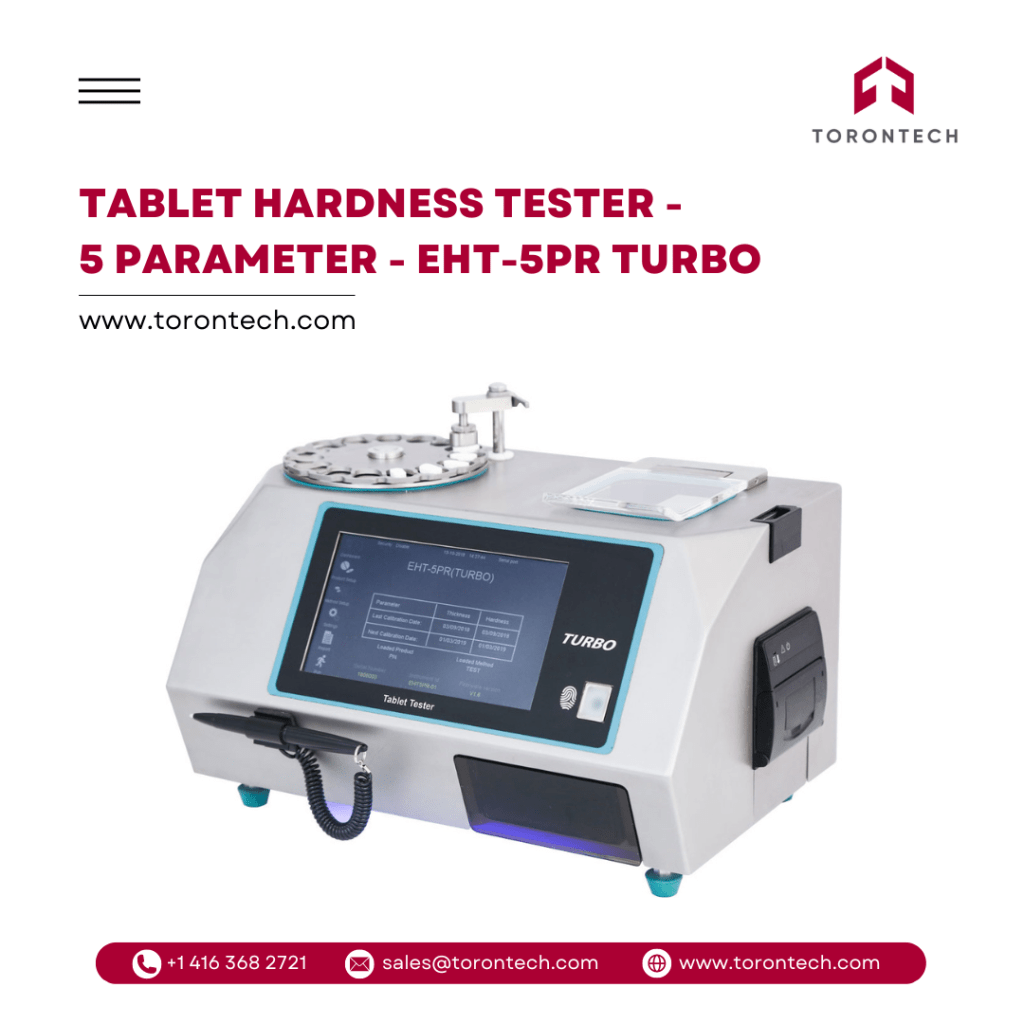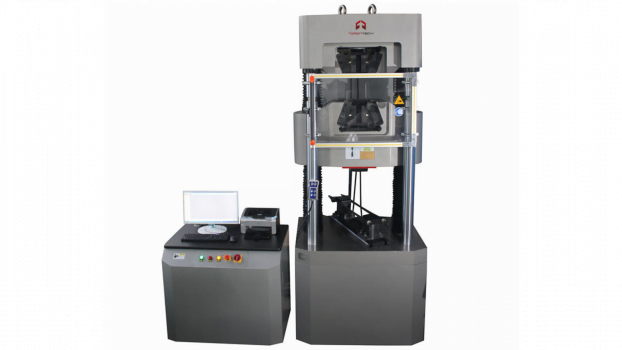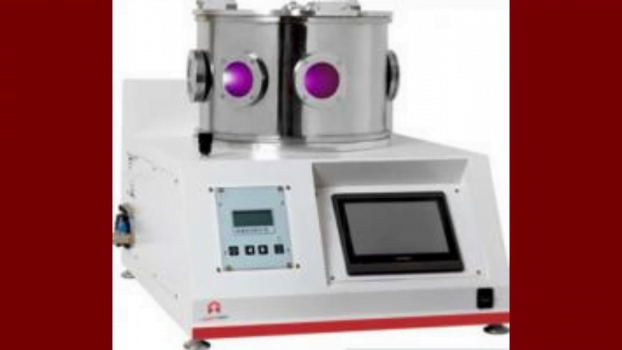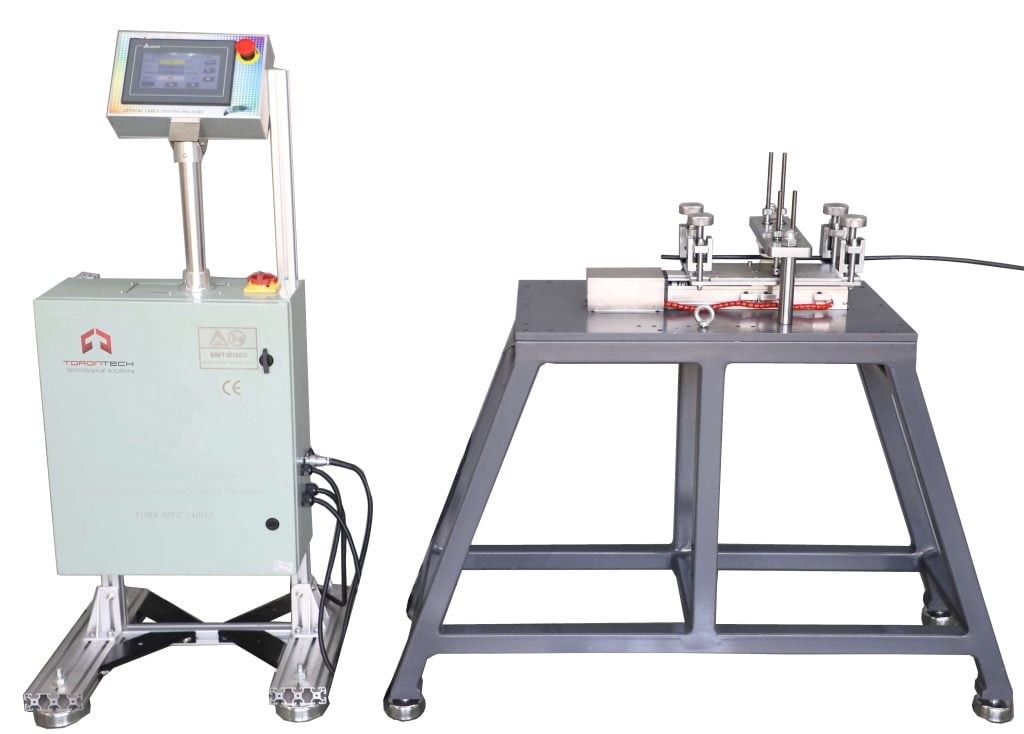In the fast-paced world of pharmaceutical manufacturing, ensuring the quality and safety of tablets is of utmost importance. One of the critical factors that contribute to tablet quality is its mechanical strength and integrity, which can be assessed using a tablet hardness tester. With its ability to provide a comprehensive analysis of tablet hardness, this innovative device has become an indispensable tool in the pursuit of excellence for pharmaceutical manufacturers worldwide.
From measuring weight, thickness, and diameter/length to evaluating hardness and beyond, Tablet Hardness Testers offer a comprehensive analysis of tablets in various shapes and sizes. These devices utilize advanced technologies, such as constant speed and force measuring principles, to provide accurate and reliable measurements, eliminating the subjectivity and variability of manual assessments.
What is The Tablet Hardness Tester?
Tablet hardness testers, also known as pharmaceutical hardness testers, are devices used to measure the mechanical integrity of pharmaceutical tablets. They are essential for ensuring that tablets meet the required standards for mechanical strength and integrity, and they are commonly used in the pharmaceutical industry to determine the breaking point and assess the quality of tablets.
There are two main processes to test tablet hardness: compression testing and 3-point bend testing. Compression testing involves squeezing the tablet between a fixed and a moving jaw, while 3-point bend testing applies force to the tablet until it breaks or fractures
This instrument can record various measurements about individual tablets, such as hardness, diameter, thickness, and weight. Some testers can also accommodate the measurement of length, which is useful when testing oblong-shaped tablets
When choosing a tablet hardness tester, factors such as test parameters, compliance with standards, ease of use, and added features should be considered. Proper calibration, regular maintenance, and inspection are crucial for accurate results.
Why Tablet Hardness Testing Is Important?
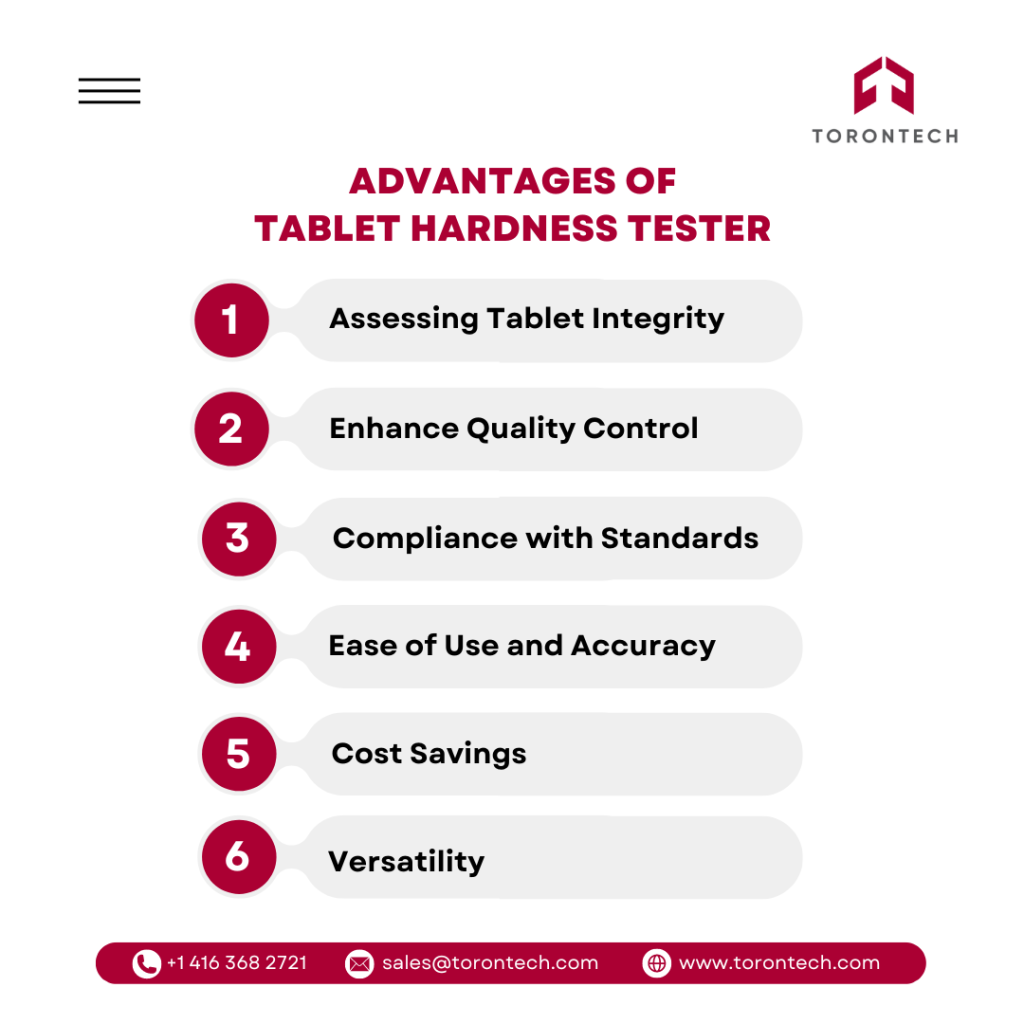
Tablet hardness testing is a critical aspect of pharmaceutical quality control, ensuring that tablets meet the required mechanical strength and integrity standards. The importance of tablet hardness testing lies in its ability to:
1. Assessing Tablet Integrity
It helps ensure the mechanical strength and integrity of pharmaceutical tablets, allowing manufacturers to assess the tablets’ resistance to stress and ensure consistent quality and performance
2. Enhance Quality Control
By measuring the breaking point or the force required to break a tablet, the instrument enables manufacturers to identify issues with formulation, compression, or other manufacturing parameters that may affect tablet strength and integrity. This, in turn, helps maintain consistent tablet quality and ensure reliable dosage delivery to patients
3. Compliance with Standards
The instrument is designed to comply with industry standards such as USP/EP guidelines, guaranteeing accurate and reliable results. This is crucial for pharmaceutical companies to confidently assess the structural integrity of their tablets and ensure they meet the necessary transportation, packaging, and handling impact
4. Ease of Use and Accuracy
The user-friendly interface and high instrument accuracy make it an efficient and reliable tool for assessing the strength and integrity of pharmaceutical tablets
5. Cost Savings
The instrument can help manufacturers save costs by identifying tablet strength and integrity issues early in the manufacturing process. This can prevent the production of defective tablets, reducing the need for rework or rejection of batches and ultimately saving costs.
6. Versatility
The instrument can test a wide range of tablet shapes and sizes, making it a versatile tool for pharmaceutical manufacturers.
In summary, the Tablet Hardness Tester ensures the quality, consistency, and performance of pharmaceutical tablets, addressing various challenges related to tablet integrity, quality control, compliance, and accuracy in the pharmaceutical industry.
Principle, Procedures, and Calibration
Let’s explore the principle and procedure behind tablet hardness testing. In this chapter, we will delve into the fundamental concepts that govern this critical analysis process, providing insights into how tablet hardness is measured and evaluated.
Tablet Hardness Tester Principle
The principle of tablet hardness testing involves measuring the force required to break a tablet. The primary purpose of tablet hardness testing is to determine the breaking point or the force required to break a tablet. This measurement is essential to assess the tablet’s stress resistance and ensure consistent quality and performance.
The tablet is placed between the lower and upper anvils of the hardness tester. The upper anvil exerts a downward force on the tablet, while the lower anvil provides support. The force is gradually increased until the tablet breaks or fractures.
The applied force is continuously monitored during the test, and the maximum force required to break the tablet is recorded. This force is typically measured in kiloponds (kp) or newtons (N). The tablet hardness value represents the tablet’s ability to withstand pressure. The measured tablet hardness value is compared against pre-established tablet hardness test acceptance criteria or specifications.
These criteria are determined during the tablet formulation and development stage and are based on the intended use and handling conditions of the tablets. If the measured hardness value falls within the specified range, the tablet is considered acceptable; otherwise, it may be deemed too weak or too hard.
Tablet Hardness Tester Procedures
The tablet hardness test procedure involves several essential steps to ensure accurate and consistent results. Firstly, a representative sample of tablets is selected for testing. The tablets are carefully handled to avoid any damage. The tablets are then placed between the platens of a tablet hardness tester, and test parameters, such as the rate of force application, are set according to the testing standards or specifications.
During the test, the tablet hardness tester applies a controlled force to the tablet until it fractures or reaches the desired deformation level. The force required is measured and recorded as the tablet’s hardness value. The procedure is repeated multiple times to obtain an average hardness value for each tablet. Acceptance criteria for tablet hardness may vary depending on the specific formulation or regulatory guidelines. Still, they typically define a range within which the hardness values should fall to ensure product quality and performance.
Tablet Hardness Tester Calibration
Calibration of hardness testers is a critical aspect of ensuring accurate and reliable measurements. Regular calibration verifies the performance of the hardness tester and ensures that it operates within the specified tolerances. The calibration process involves comparing the readings of the hardness tester against reference standards of known hardness values. If any deviations or discrepancies are identified, adjustments or recalibration may be necessary to maintain the accuracy of the hardness tester.
By adhering to these principles, procedures, and calibration practices, pharmaceutical manufacturers can ensure the reliability and validity of tablet hardness testing in their quality control processes.
The Types of Tablet Hardness Testers
Tablet hardness testers are essential laboratory apparatus used to assess the mechanical strength and integrity of pharmaceutical tablets. There are several tablet hardness testers, each with its principles and applications.
Manual Tablet Hardness Tester
The tablet hardness tester manual is operated by hand and requires the user to apply force to the tablet using a simple movement of a jaw or bar. These testers are generally more affordable and are suitable for basic hardness testing requirements. However, they may be less accurate and slower than automatic or digital testers.
Automatic Tablet Hardness Tester
Automatic tablet hardness testers, on the other hand, utilize motorized mechanisms to apply force to the tablet. They are known for their higher accuracy and faster testing capabilities. While they are more expensive than manual testers, they are often preferred for high-throughput testing and when precision is critical.
Digital Hardness Tester
This instrument uses electronic sensors to measure the force required to break the tablet. They provide precise and detailed data, making them suitable for applications where accuracy is paramount. These testers are often equipped with digital displays and advanced data recording features.
Portable Tablet Hardness Tester
This type of tester is designed to be compact and lightweight, making it easy to transport and use in various locations. Portable tablet hardness testers are ideal for quality control and compliance testing in manufacturing facilities and laboratories. They are compact, lightweight, and offer the flexibility to perform hardness testing at different sites, such as manufacturing facilities, warehouses, or quality control laboratories.
Tablet hardness testers are available in various types, including manual, automatic, digital, and portable testers. The choice of tablet hardness tester depends on the specific testing requirements, budget, and the level of accuracy and automation needed for the intended applications.
Tablet Hardness Tester Price
The price of tablet hardness testers can vary significantly depending on the type, brand, features, and capabilities. Manual tablet hardness testers are generally more affordable, with prices ranging from a few hundred to a few thousand dollars.
Automatic and digital hardness testers, which offer higher accuracy and advanced features, are typically more expensive, ranging from a few thousand to tens of thousands of dollars. Portable tablet hardness testers, designed for ease of transport and use in various locations, also vary in price based on their features and capabilities.
It’s important to consider the specific testing requirements, budget, and the level of accuracy and automation needed when evaluating the price of a tablet hardness tester. Additionally, factors such as after-sales support, warranty, and the availability of calibration and maintenance services should be considered when making a purchase decision.
Introduce Tablet Hardness Tester – 5 Parameter – EHT-5PR Turbo
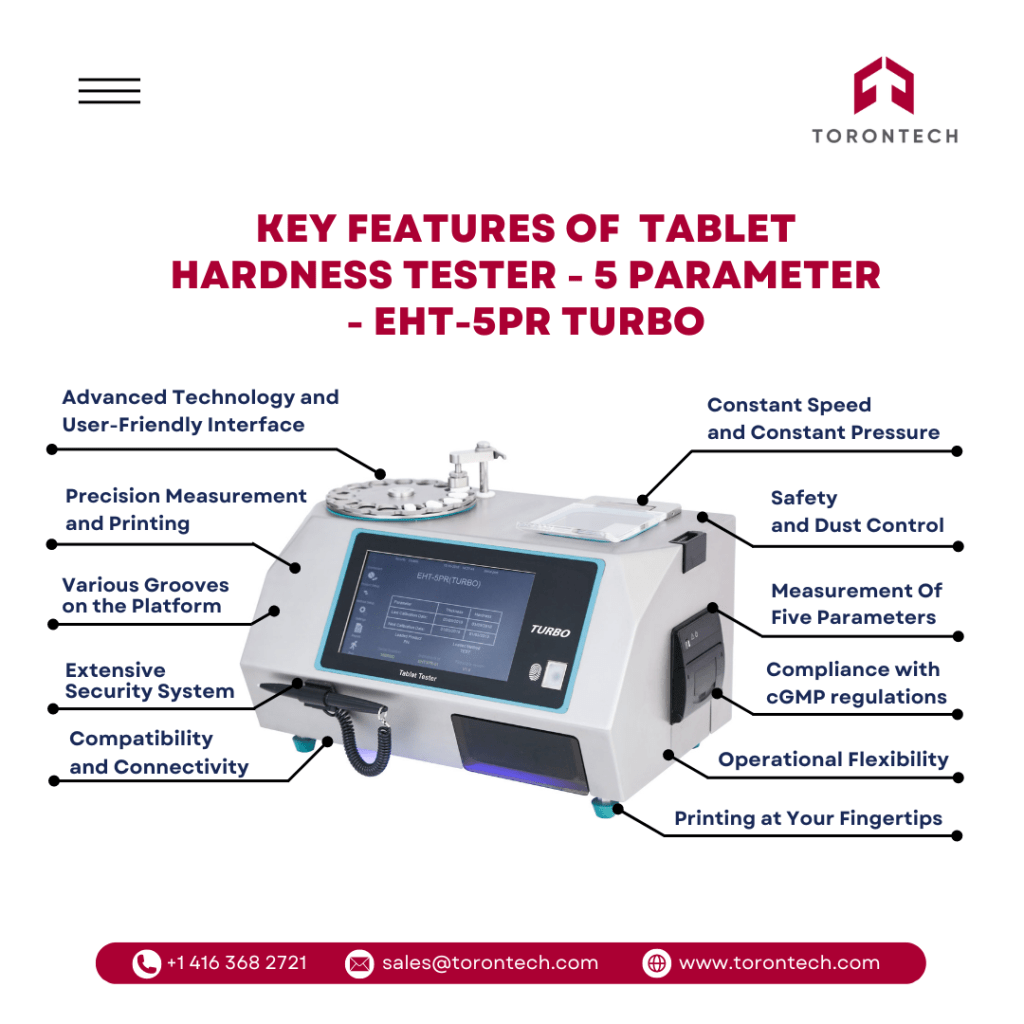
The tablet hardness tester – 5 parameter – EHT-PR Turbo, by Torontech, has maintained its reputation as a highly suitable device for research within the pharmaceutical industry. Powered by cutting-edge features, this equipment not only emphasizes accuracy in tablet hardness measurements but also reinforces the quality and consistency of the produced tablets.
It has met the high standards expected in the modern pharmaceutical industry and has become a key element in ensuring the quality and homogeneity of safe and effective pharmaceutical tablet products. These are some key features you must know about our product.
1. Measurement Of Five Parameters
The device measures weight, thickness, diameter/length, width, and hardness, providing a comprehensive analysis of tablet properties. Virtually all tablet shapes, including round, oval, oblong, and even unique shapes.
2. Advanced Technology and User-Friendly Interface
The machine is equipped with a full-color 7.0-inch touchscreen, offering an intuitive and user-friendly interface. Its technology ensures precision and efficiency in tablet hardness testing.
3. Constant Speed and Constant Pressure
This tablet hardness tester utilizes the principle of constant speed and pressure measurements, ensuring accurate and consistent results. It can accommodate up to 100 samples per test, making it suitable for high-productivity pharmaceutical manufacturing.
4. Various Grooves on the Platform
It features a platform with various grooves, allowing flexibility in testing tablets of different sizes and shapes. The dual-platform system includes both large and small grooves to meet your specific testing needs.
5. Extensive Security System
With three levels of user management security, the tablet hardness tester – 5 parameter – EHT-PR Turbo protects sensitive data and ensures controlled access. Calibration expiry date indicators help maintain measurement accuracy. The device offers user-selectable templates for report printing, enhancing documentation and traceability.
6. Operational Flexibility
This tablet hardness tester operates in automatic and manual modes, with customizable delay times and sample interval settings. A tablet handling tray simplifies the transfer of tablets from the scale to the testing device.
7. Safety and Dust Control
The tablet hardness tester – 5 parameter – EHT-PR Turbo prioritizes operator safety by including a protective cover to guard against inhalation of tablet dust, especially during testing where there is a risk of tablet “explosion.”
8. Precision Measurement and Printing
This equipment covers a wide hardness range from 3 N to 800 N with an accuracy of ±1 N. Measurement parameters include weight, internal and external thickness, diameter, length, width, and hardness. The platform opening is 40 mm, with the option to extend it to 65 mm. The device allows using various units for thickness and diameter, such as millimeters or inches.
9. Compatibility and Connectivity
This device is compatible with scales from renowned brands like Sartorius, Mettler Toledo, Shimadzu, Contech, Ohaus, and Radwag. The Tablet hardness tester – 5 Parameter – EHT-PR turbo also offers LAN and serial interfaces for seamless data exchange.
10. Printing at Your Fingertips
With a built-in printer, this tablet hardness tester can quickly generate test results, validation reports, and calibration reports, streamlining your quality control process.
11. Compliance with cGMP regulations
The device is made of stainless steel for increased durability, complying with cGMP regulations. Ensuring that the device meets industry standards.
As an essential tool in the pharmaceutical industry, The Tablet hardness tester – 5 parameter – EHT-PR Turbo upholds the highest quality standards for tablets. It has received recognition and appreciation from various parties worldwide, reaffirming its significant role in supporting pharmaceutical research and industry.
Conclusion: Embrace Excellence in Tablet Hardness Testing
Our Tablet Hardness Tester EHT-5PR Turbo offers advanced features and functionalities that optimize the tablet hardness testing process. With its precise force application and intuitive controls, the EHT-5PR Turbo ensures accurate and consistent hardness measurements, providing you with invaluable insights into the quality of your tablets. Its user-friendly interface and automated capabilities simplify testing procedures, saving time and effort.
By choosing our product and partnering with us, you gain access to cutting-edge technology, exceptional customer support, and a commitment to empowering your pharmaceutical manufacturing processes.
To discover how the Tablet Hardness Tester EHT-5PR Turbo can revolutionize your tablet hardness testing, we invite you to get in touch with our dedicated team. Whether you have inquiries, need technical support, or wish to request a demonstration, our experts are ready to assist you.
For more information about Torontech’s innovative other medical or pharmaceutical testing instrument, please click here. To explore the possibilities of excellence in tablet hardness testing, contact us today.

